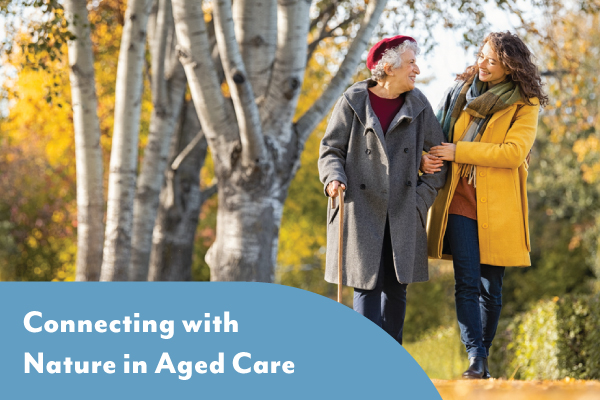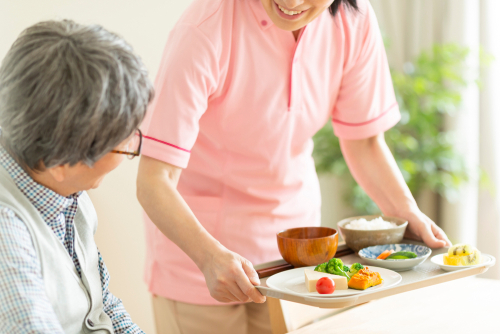Throughout elderly people’s lives, technology has advanced dramatically. From breakthroughs that saw humans land on the moon, developments on the medical front and the introduction of the internet, technological progress has set a rapid pace. Fast forward to today and video calling with people across the globe is easily and instantly achievable from the comfort of your couch.

While younger people have taken up new technology and find it relatively easy to use, many older individuals have been less inclined. They might not see how technology could benefit them, or they may not be aware of what’s available – not to mention how to use it.
Since the onset of the pandemic, the value of technology has increased for many including in aged care settings, both residential care and home care. It has ensured that people can continue to connect with their families and friends, and continue with health appointments, lifestyle activities and more in a safe way.
As aged care workers, supporting elderly with understanding and utilising technology to improve their lives should be incorporated into care. Providing a solid foundation for older Australians to embrace technology can provide them with a range of benefits now and into the future.
Benefits of embracing technology at any age
Technology can impact the way we go about living our lives, and in many cases can make things a little easier. We can avoid long commutes and time spent on hold on the phone, instead opting to get things done via websites and apps. These are all easily accessible from standard computers and phones and can be budget-friendly as needed.
Save time, save money and save the need to go out unnecessarily, especially during the pandemic by getting things done online. Some of the benefits elderly people might enjoy about embracing technology include:
Social connection:
This is a big one, especially in light of the pandemic and restrictions on in-person contact between people. Loneliness is a huge concern for the elderly. Thankfully technology means that video calls are accessible at the tap of a screen, text messages help keep regular, casual contact, and don’t forget about email to marry the joy of crafting prose for a letter with the convenience and speed of sending via the internet. Plus, rather than having to wait until photos of the grandkids are printed out and posted over, they can start a collection of treasured images that can be sent in bulk instantly.
Online banking:
Visiting banks in 2021 and the queue tends to be made up primarily of an older demographic. Let elderly people know how easy and convenient it can be to do banking online. This includes keep track of incomings and outgoings, and even paying bills. During the pandemic, this is useful to minimise the need to be out and about.
Ordering online:
Heading to a shopping centre and browsing is an enjoyable activity, but when that’s not possible there are plenty of options online. Elderly people can enjoy browsing their favourite stores online and order the things they need or want to arrive at their door.
Entertainment:
Movies or television programs old and new are in endless supply online for elderly people to relive their favourites or discover something new to keep them engaged and entertained. They can also benefit from being able to find all the music they could possible think of!
Enhancing quality of life through technology
As well as apps and websites accessed via smart devices, there are other pieces of equipment that can not only make life easier but also safer. Wearable glucose monitors for diabetics, ECG, blood pressure and heart rate monitors, fall detectors and more are incredibly valuable for peace of mind and to assist healthcare providers — and they could even save lives.
Here are few other gadgets and tools that older people can use to maintain physical health, keep their minds active and stay connected:
Health tracking:
Knowledge is power and this is especially true when it comes to matters pertaining to health. Wearable devices are readily available, such as fitness watches and the various health monitors mentioned above for heart rate, blood pressure, glucose and more. Smart devices can pair with devices to collect medical data that can be of genuine use to doctors and health professionals when it comes to assessing an elderly person’s health status.
Tablets and iPads:
The larger screen of a tablet can be useful to support those with eyesight difficulties. These devices can be used for a range of purposes, including shopping, banking, connecting with loved ones, watching movies, listening to music or reading.
Apps:
There are many apps that are designed to train the brain, keep minds active and even keep the body fit. Plus, there are plenty of games that are just fun too. Apps for mental stimulation and to encourage good physical health are highly valuable for the elderly to enhance quality of life.
Organisation apps:
Keep track of appointments and medications can be made easier with apps. For example, Medisafe helps with medication reminders including when to renew scripts and take medications.
Social connection:
There are countless ways to connect with family and friends via devices and apps. Messaging apps, video call options, Skype, Zoom, Facebook — best of all, most of them are free to use.
Connect with the world:
Staying in the know has never been easier with news outlets taking up plenty of online real estate. Peruse the latest from news across the globe or look at the events in your local area. Best of all, depending on their abilities and preferences there are options for audio, visual or both.
Supporting elderly people as they learn new technology
While some elderly people have taken up technology, others may have been less inclined. The level of proficiency at day-to-day use of computers, devices and a range of modern technology can vary even within people of a similar age. With this in mind, teaching elderly about how to gain the benefits of technology might need to be individualised, however running group sessions can be a great way to start.
Here are a few tips to support the elderly effectively as they learn to navigate what might be completely new technology for them:
Be patient:
Patience is a must in many areas of aged care work, and teaching technology skills is no exception. Remember, things that may be obvious to you may not make any sense to them initially.
Ensure devices meet their needs:
Adjusting text size and turning the volume to the right level can make a big difference for a person who is hard of sight or hearing and is trying to get used to new technology.
Take it step by step:
It can be easy to rush in when you’re so familiar with the use of technology. When teaching it however, take it slow and break it down into simple steps, talking your elderly residents through as you go.
Address security concerns:
It’s not uncommon for elderly people to worry about their security online. Address those concerns where possible, for example by showing them their privacy options in various apps and programs. Explain that the padlock icon shows a website is secure. Advise to avoid sharing any information with a person they don’t know and not to click on suspicious links. Focus on strong passwords — it’s worth recommending writing down their passwords can be useful to ensure they don’t get locked of accounts or downloading a password manager to their device).
Keep it light and helpful:
Learning new things can be a challenge for anyone, so keep it light and focus on ensuring the elderly in your care are feeling empowered rather than frustrated or embarrassed in their learning journey. Celebrate the wins every step of the way.
Opening up a new world for the elderly
By introducing new technology to the elderly in your care, you are opening up a whole new world of connectivity. Staying social, keeping up with the latest news, shopping with ease and enjoying everything the internet and devices have to offer can bring a lot of happiness.
Sharing this learning journey together can also help to build your relationship with those in your care.



